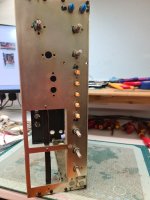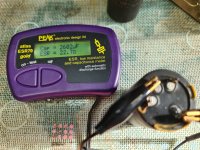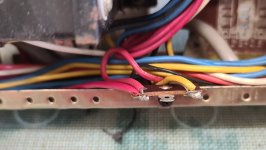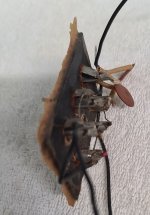Basically, wood-based materials have no place in audio amplifiers. A knock test is enough to know how they modulate the sound (the current, the signal).
One chance is to decouple the wooden materials from the metal housing, whether with rubber or metal washers or something similar. It should (it will) be clearly audible.
One chance is to decouple the wooden materials from the metal housing, whether with rubber or metal washers or something similar. It should (it will) be clearly audible.
@cumbb
'Basically, wood-based materials have no place in audio amplifiers. A knock test is enough to know how they modulate the sound (the current, the signal).
One chance is to decouple the wooden materials from the metal housing, whether with rubber or metal washers or something similar. It should (it will) be clearly audible’
Whilst i would agree with you to a certain extent, it does depend on alot more factors, including how good someones hearing is and the room conditions have to be taken into account, size,type of furnitings,etc.
Im no expert of course, but these are know factors, and i wouldnt think in most 'average house's ' cases, most people wouldn't notice the difference. 👍
Last edited by a moderator:
Better watch it - he’ll have you using BD441/2 as output transistors in EF1. I did buy some in with a Mouser order last week (mostly shop supplies) so I could actually try it for myself and see if it even works up at +-30V. I’m expecting a fireball, but I’m curious as hell what @cumbb is hearing. Personally, I think you’d have better result with those Exicon LatFets, and you already know that works. If you wanted to change the power stage from 2N3055’s.
Probably the biggest upgrade you can do sound wise in the power amplifier is to strictly enforce differential balance. In this implementation it is NOT. Doing so will have sonic benefits. Match the transistors, and adjust as required to match the currents (current mirror can be added, or trim the load resistor). This is one reason the singleton input stage of the 3020 is preferred - balance is NOT required to obtain proper subtraction between input signal and the feedback. It happens by default. Unbalanced diff pairs don’t do as well as singletons, period. Balanced ones do better than a singleton, but require attention to detail.
Probably the biggest upgrade you can do sound wise in the power amplifier is to strictly enforce differential balance. In this implementation it is NOT. Doing so will have sonic benefits. Match the transistors, and adjust as required to match the currents (current mirror can be added, or trim the load resistor). This is one reason the singleton input stage of the 3020 is preferred - balance is NOT required to obtain proper subtraction between input signal and the feedback. It happens by default. Unbalanced diff pairs don’t do as well as singletons, period. Balanced ones do better than a singleton, but require attention to detail.
I must admit that when I work on audio gear, vibration is something that I go to greater lengths to reduce. Vibration comes from everywhere! Inside and outside the unit. Using a variety of damping materials and added bracing is the route that I choose. Whatever I end up with, it always weighs significantly more than when I started on it. Of course, I am especially aware of this when working on tube equipment. Some of the tubes are incredibly microphonic! Wouldn't have believed it if I hadn't clearly heard it in action.
Hi.Im still considering the FETS.Better watch it - he’ll have you using BD441/2 as output transistors in EF1. I did buy some in with a Mouser order last week (mostly shop supplies) so I could actually try it for myself and see if it even works up at +-30V. I’m expecting a fireball, but I’m curious as hell what @cumbb is hearing. Personally, I think you’d have better result with those Exicon LatFets, and you already know that works. If you wanted to change the power stage from 2N3055’s.
Probably the biggest upgrade you can do sound wise in the power amplifier is to strictly enforce differential balance. In this implementation it is NOT. Doing so will have sonic benefits. Match the transistors, and adjust as required to match the currents (current mirror can be added, or trim the load resistor). This is one reason the singleton input stage of the 3020 is preferred - balance is NOT required to obtain proper subtraction between input signal and the feedback. It happens by default. Unbalanced diff pairs don’t do as well as singletons, period. Balanced ones do better than a singleton, but require attention to detail.
Unless i spend a silly amount of cash on this thing, and i would if i was going to keep it, im inclined to try and use what i have here, and i have a spare set of FETS.im a converted fan of those things, the biggest thing to have to deal with is the heat, but there is plenty of room in there to deal with it.
I am a fan of the 3020 (up to the 'b' VERSION), although the first generation units sound best once you have done the post factory mods(IMO)
I know alot of perople are not a fan of the older NADS,but i think ,although some of the build qualities are not the best, Bjørn Erik Edvardsen certainly made a game changer with that amp.
I use BD140/139 alot, and cant see personaly whats wrong with them.from what i can make out from people like @Mooly , those along with transistors such as the 2SD669A/649A were pretty much staples back in the day, and very reliable.
But as i said im not an expert by any stretch.
FETS are the way forward for me with this amp i think.
There is nothing wrong with BD139/40. Well, the fact that they are only 80 volt devices so you can’t use them in the big boys. The D669/B649 are “nicer” devices than are needed to drive 2N3055’s. But they were often used everywhere, and in multiple models giving them a good price on them. The biggest complaint people seem to have about the BDs is that fT is not guaranteed 190 MHz anymore. Driving 2N3055’s so what? You wouldn’t measure a difference with anything above 20 MHz. They are still a good epitaxial planar (ie fast, sustained-beta) pair, and the beta holds up well at vce=2V. Really good for low voltage operation, in fact. Even in the VAS position, it is preceded by a follower - so that little TO-92 dominates the characteristics.
@Goldie99 ,thanks for the PM's, ive decided to do what you suggested.Whether i go with the original design or not is the question.
whoever took them, they just snapped them off! so they are still attached on the underside.
So considerations:
for the phono pre amp, stick with the plug in design or go with the same design/simlar and seperatly mount?
If im going to use FETS ive got to modify the underside with those common collectors,I havent checked yet but i presume hard wire fed on the upper board side.-tidy it all up and remove the driver sections.
Those rusty rear RCA's have to go.possibly convert to gold plate? or leave original?
possibly convert the grab terminals with push in's? or leave it original
Replace all those old diodes.I have found quite a few over time that have been cracked-poor quality maybe?
Not many caps to replace
one channel has 30v on the speaker output fuse,(no lamp on though, so thats odd) so i need to find and fix that first
so lots to think about and do!
whoever took them, they just snapped them off! so they are still attached on the underside.
So considerations:
for the phono pre amp, stick with the plug in design or go with the same design/simlar and seperatly mount?
If im going to use FETS ive got to modify the underside with those common collectors,I havent checked yet but i presume hard wire fed on the upper board side.-tidy it all up and remove the driver sections.
Those rusty rear RCA's have to go.possibly convert to gold plate? or leave original?
possibly convert the grab terminals with push in's? or leave it original
Replace all those old diodes.I have found quite a few over time that have been cracked-poor quality maybe?
Not many caps to replace
one channel has 30v on the speaker output fuse,(no lamp on though, so thats odd) so i need to find and fix that first
so lots to think about and do!
Attachments
I use BD140/139 alot, and cant see personaly whats wrong with them.from what i can make out from people like @Mooly
There is nothing wrong with them in applications like this. Despite being old they they are a tried tested and trusted part.
The old Hitachi 2SD's and 2SB's were also very good indeed and I remember back in the day ordering these direct from Hitachi UK along with the old T03 style lateral FET's for a JLH lateral FET design.
so ive strated the strip down,and there is alot to do
All the cables have been numbers and photographed
need to find some replacement terminals for the rear
just the rear terminals to remove along with the main PCB, then i can get to work cleaning it before i go any further.
I still cant decide if to go with originality or modify
Originality to me seems to be the way to go realy
Those main caps were well down,lowest ive ever seen,(originaly 6800uf) other than fully shorted.
All the cables have been numbers and photographed
need to find some replacement terminals for the rear
just the rear terminals to remove along with the main PCB, then i can get to work cleaning it before i go any further.
I still cant decide if to go with originality or modify
Originality to me seems to be the way to go realy
Those main caps were well down,lowest ive ever seen,(originaly 6800uf) other than fully shorted.
Attachments
-
 20241012_151601.jpg47.6 KB · Views: 155
20241012_151601.jpg47.6 KB · Views: 155 -
 20241012_151546.jpg185 KB · Views: 149
20241012_151546.jpg185 KB · Views: 149 -
 20241012_150921.jpg271 KB · Views: 149
20241012_150921.jpg271 KB · Views: 149 -
 20241012_150910.jpg575.5 KB · Views: 161
20241012_150910.jpg575.5 KB · Views: 161 -
 20241012_150810.jpg656.9 KB · Views: 160
20241012_150810.jpg656.9 KB · Views: 160 -
 20241012_150741.jpg605.7 KB · Views: 158
20241012_150741.jpg605.7 KB · Views: 158 -
 20241012_140822.jpg209.5 KB · Views: 147
20241012_140822.jpg209.5 KB · Views: 147 -
 20241012_140810.jpg280.2 KB · Views: 141
20241012_140810.jpg280.2 KB · Views: 141 -
 20241012_140714.jpg300.7 KB · Views: 130
20241012_140714.jpg300.7 KB · Views: 130 -
 20241012_140711.jpg200 KB · Views: 154
20241012_140711.jpg200 KB · Views: 154 -
 20241012_140703.jpg541.8 KB · Views: 162
20241012_140703.jpg541.8 KB · Views: 162
I still cant decide if to go with originality or modify
Originality to me seems to be the way to go realy
I think that really depends on your goals, whether to keep it or whether to refurb it for a sale.
so the strip down is complete.
A few challenges, mainly the rear terminals, they are beyond saving, so i need to look at replacing them.Problem with these is that they were pressed into the holding plate in the factory, so ill have to look at an alternative method, but keeing the original look.
The case can be cleaned, as can the front cover and PBC
A few challenges, mainly the rear terminals, they are beyond saving, so i need to look at replacing them.Problem with these is that they were pressed into the holding plate in the factory, so ill have to look at an alternative method, but keeing the original look.
The case can be cleaned, as can the front cover and PBC
Attachments
Ive cleaned the main PCB,repaired the wooden cover and re covered it.
The metal vent grille re sprayed
The base plate has been sprayed as it was realy rusty and would have cost quite alot to get re treated
The metal vent grille re sprayed
The base plate has been sprayed as it was realy rusty and would have cost quite alot to get re treated
Attachments
Well I have to say it looks great 🙂 What can I say... if you enjoy refurbing them then go for it.
- Home
- Amplifiers
- Solid State
- NAD 3030 complete rebuild













